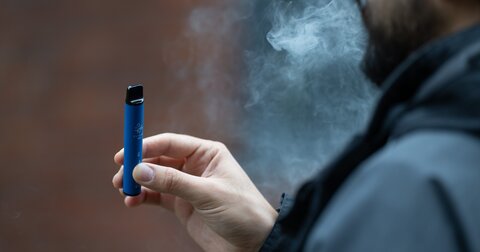Flavored e-cig ban leads to more youth cigarette smoking
Study finds unintended consequence as youth turn to cigarettes instead of less-harmful alternative
Michigan is proposing a ban on flavored e-cigarettes that two just-released studies say will lead to more teen cigarette smoking. Advocates say that e-cigarettes are much safer than the traditional combustible version.
A June 2024 working paper published by the National Bureau for Economic Research found evidence that under flavored-nicotine bans, “Young adults decrease their use of the banned flavored e-cigarettes as well as their overall e-cigarette use, by about two percentage points, while increasing cigarette use.”
The paper by Henry Saffer and four other researchers, which hasn’t been peer-reviewed, found the bans do not affect e-cigarette and smoking participation among adults ages 25 and older.
“Our findings suggest that statewide comprehensive flavor bans may have generated an unintended consequence by encouraging substitution towards traditional smoking in some populations,” the paper says.
Saffer and his co-authors cited an online survey of 1,624 adult e-cigarette users subject to nicotine flavor bans in Washington, New Jersey and New York. The survey found that post-ban, 8.1% of e-cigarette users stopped using e-cigarettes, and the share of participants using non-flavored e-cigarettes increased from 5.4% to 25.4%.
The survey found that 45% of e-cigarette users continued to purchase the banned flavors from in-state retailers. Others, however, bought online or on the black market, crossed state lines, or mixed flavors themselves.
The second working paper published by the National Bureau of Economic Research found evidence of “unintended effects” in which people age 18 to 20 substitute cigarettes for flavored nicotine.
After the flavored nicotine bans went into effect, the study found a 34% to 55% increase in the probability that youth smoke menthol cigarettes, cigars, or pipes.
In 2019, Gov. Gretchen Whitmer issued emergency orders to ban flavored nicotine, calling it a public health emergency. A court tossed the orders, and the Michigan Supreme Court declined to reinstate the ban.
Senate bills 649 and 650, sponsored by Democrats Sens. John Cherry, Sam Singh, and Sue Shink, aim to ban all flavored e-cigarettes.
Vaping advocates say using flavored nicotine e-cigarettes is one of the best ways to stop smoking cigarettes, which the Centers for Disease Control and Prevention says cause about 480,000 deaths per year.
Guy Bentley, director of consumer research at the Reason Foundation, says flavored nicotine is a safer alternative to cigarettes.
“We know e-cigarettes are substitutes, not complements, to cigarettes that can improve public health,” Bentley said in a statement. “The harder the government cracks down on safer alternatives to cigarettes, the more people will start or continue to smoke, which research shows is far more bad for your health than vaping.”
Bentley said that any flavored nicotine prohibition would bring a worse public health outcome.
“Flavored e-cigarettes are the most popular alternative to cigarettes. Kids can and must be protected from all nicotine products, but prohibition, more often than not, will result in worse outcomes for public health. It’s time for commonsense approaches to vaping that embrace the positive role it can play in harm reduction efforts.”
Michigan Capitol Confidential is the news source produced by the Mackinac Center for Public Policy. Michigan Capitol Confidential reports with a free-market news perspective.


 Whitmer seeks $7.8M for road funding solution, six years after pledging to fix the roads
Whitmer seeks $7.8M for road funding solution, six years after pledging to fix the roads
 Has the first tax hike of 2024 just dropped?
Has the first tax hike of 2024 just dropped?
 Michigan pushes $762M pre-K expansion while K-12 performance declines
Michigan pushes $762M pre-K expansion while K-12 performance declines